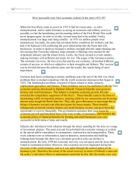Lebensraum and autarky were the twin pillars of nazi economic policy?
To answer the above question I will first have to look at the nazi ideology of lebensraum and autarky. The political concept of Lebensraum "living space" was proffered by others in Germany decades before Adolf Hitler came to power. Adding living space was believed to strengthen Germany by helping solve internal problems, make it militarily stronger, and help make Germany become economically self-sufficient by adding food and other raw material sources. Hitler changed the concept of Lebensraum. Rather than adding colonies to make Germany larger, Hitler wanted to enlarge Germany within Europe. So, in Nazi ideology, Lebensraum meant the expansion of Germany to the east in search of a unity between the German Volk and the land (the Nazi concept of Blood and Soil). The Nazi modified theory of Lebensraum became Germany's foreign policy during the Third Reich.
Autarky means self-sufficiency, in other words non-dependence on others. In Nazi Germany autarky was especially relevant for industries that were associated with armament production, notably iron and steel. Germany reflecting on their defeat in 1918, some Germans put much blame on the failure of economic preparation. Their conclusion was that in future war would be conflict not between armies but between economies as well. In consequence, in the 1920s, the concept of Wehrwirtshaft (defence-led economy) gained increasingly wide acceptance and the Army established an Economics Staff. Needless to say, Hitler was a supporter of Wehrwirtschaft, and gave it impetus after 1933. The implementation of autarkic policies was not open and the result of Reich Government debate and decision but by crafty subordination of existing economic organisations. A reorientation of Germany’s trading partners was complementary to autarkic policy. Whereas trade with the major powers, who were soon to be at war with Germany - Britain, the USSR and the United States - declined, in the 1930s trade, especially for the import of raw materials and food, with the Balkans and the Central/South American states, sometimes on a barter basis, increased.








